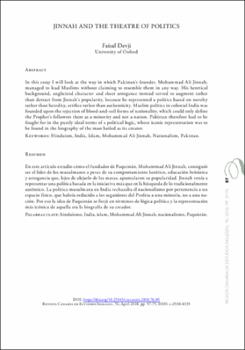Jinnah and the Theatre of Politics
Author
Devji, FaisalDate
2018Abstract
En este artículo estudio cómo el fundador de Paquistán, Mohammad Ali Jinnah, consiguió ser el líder de los musulmanes a pesar de su comportamiento herético, educación británica y arrogancia que, lejos de alejarlo de las masas, apuntalaron su popularidad. Jinnah venía a representar una política basada en la iniciativa más que en la búsqueda de lo tradicionalmente auténtico. La política musulmana en India rechazaba el nacionalismo por pertenencia a un espacio físico, que habría reducido a los seguidores del Profeta a una minoría, no a una nación. In this essay I will look at the way in which Pakistan’s founder, Mohammad Ali Jinnah, managed to lead Muslims without claiming to resemble them in any way. His heretical background, anglicized character and sheer arrogance instead served to augment rather than detract from Jinnah’s popularity, because he represented a politics based on novelty rather than heredity, artifice rather than authenticity. Muslim politics in colonial India was founded upon the rejection of blood-and-soil forms of nationality, which could only define the Prophet’s followers there as a minority and not a nation. Pakistan therefore had to be fought for in the purely ideal terms of a political logic, whose iconic representation was to be found in the biography of the man hailed as its creator.





